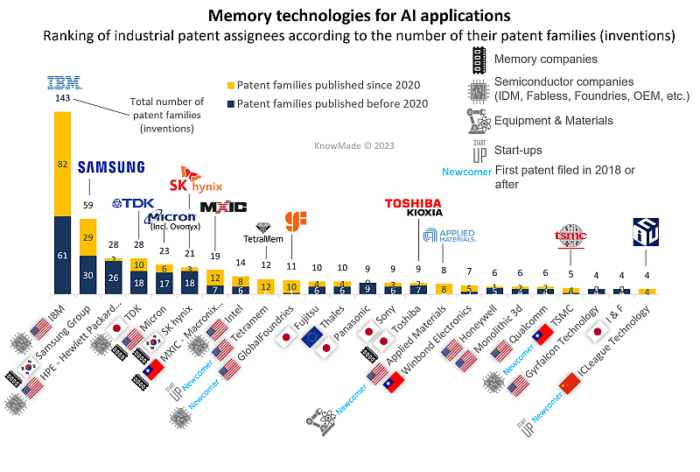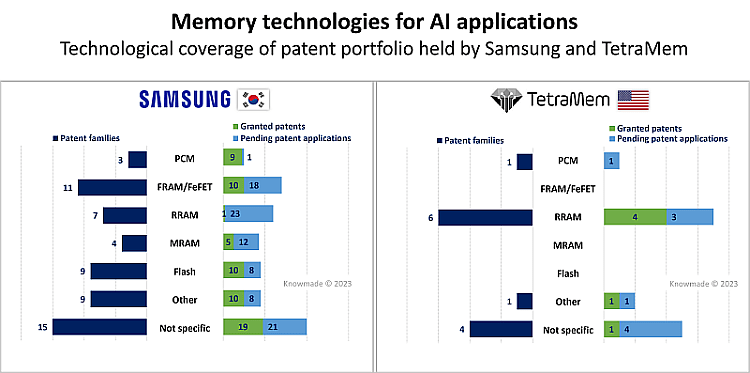SOPHIA ANTIPOLIS, France – June 06, 2023 │ Since 2015, the number of new inventions for artificial intelligence applications focused on memory hardware has been booming. Here we look at the non-volatile memories, which are intensively investigated by semiconductor companies. Numerous patent applications relate to device fabrication, system architecture, selectors, and testing, and address major technical bottlenecks. While fierce competition exists between key semiconductor players like Samsung or IBM, newcomers are sneaking in. In this article, we shed light on the intellectual property (IP) activity of one of the newcomers, TetraMem.
The competitive IP landscape is diversifying
As the floods of data are becoming more and more important, the need for high performance computing has become stringent. Among the cutting-edge technologies driving innovation in the semiconductor industry, neuromorphic computing has emerged as a promising possibility, that could enable data management in a more effective manner. Large integrated device manufacturers (IDMs) and memory makers, like Samsung or IBM, own broad patent portfolio of memory technologies that can be used for artificial intelligence (AI) applications: magnetoresistive random-access memory (MRAM), phase-change memory (PCM), resistive random-access memory (RRAM or memristors), ferroelectric random-access memory (FeRAM), or ferroelectric field-effect transistor (FeFET). In our latest research, not only did we find that established semiconductor IP players are strong leaders in developing memory for AI, but those big companies also keep a heads up in more path finding activity with 2D materials (Samsung) and synaptic transistor (IBM). In addition, with a detailed look at the patent applicants over the last three years, we identified newcomers sneaking in the patent landscape. The competitive IP landscape of memory technologies for AI applications is clearly diversifying: the start-ups TetraMem and ICLeague, the equipment supplier Applied Materials, and even established IC foundries have joined the competition. IP profiles of main semiconductor industrials and newcomers have been reviewed in KnowMade’s report Memory for Artificial Intelligence Patent Landscape Analysis 2023.

Figure 1: Ranking of industrial patent assignees according to the number of their patent families (inventions) related to memory technologies for artificial intelligence (AI) applications. Source: KnowMade, Memory for Artificial Intelligence Patent Landscape Analysis 2023.
A closer look at TetraMem, a newcomer joining the innovation competition
While leading IP players are publishing new patent applications on a broad range of emerging memory technologies, newcomers are sneaking in the patent landscape quietly, with a focused technology portfolio. One example sticking out from our detailed IP landscape on memory for AI is TetraMem.
TetraMem is a pure-player start-up company founded in 2018. As the company was set up by Hewlett-Packard (HP) former employees, it beneficiates from a strong RRAM expertise, builds on HP experience, and moves fast towards high-density RRAM integration. The patent portfolio focuses on RRAM device integration in crossbar memory arrays for in-memory computing and selectors associated to the RRAM cells. In a high-density network of RRAM cells integrated in crossbar memory arrays, one of the technical challenges is the presence of large parasitic currents. Sneak path current may trigger unwanted actions (e.g., unintended programming) and may prevent desirable outputs (e.g., read errors). As a result of these technical issues, during a neuromorphic computing process for instance, computation results may be altered. In a detailed analysis of TetraMem patented inventions, KnowMade reveals that the start-up is mainly protecting technologies (RRAM device, selector device, circuit design) that address the sneak path current challenge for improved reliability in crossbar memory arrays and is making fast progress. Additionally, TetraMem is seeking IP protection for reliable and low power RRAM devices. Innovation has accelerated, taking the technological lead is becoming more and more important for semiconductor companies.

Figure 2: Comparison of the patent portfolio related to memory technologies for AI applications held by established IP player Samsung vs. IP newcomer TetraMem. Source: KnowMade, Memory for Artificial Intelligence Patent Landscape Analysis 2023.
Memory hardware development targeting artificial intelligence technology deployment is a blooming field of innovation. The ecosystem is diversifying with all kinds of companies from start-ups to established players, to IC semiconductor industrials and equipment suppliers. Lots of companies are intensifying their patenting activity to secure their share of the AI market. Further analysis is required to get the big picture. Who is taking the lead and is there a specific technology more favorable than others for AI application? Unique IP portfolios analysis combined with high technical expertise is giving us a competitive insight on what is happening in the field. Check out KnowMade’s analysis on this topic: Memory for Artificial Intelligence Patent Landscape Analysis 2023.
You may be also interested in:
Other related memory patent landscape reports
Press contact
contact@knowmade.fr
Le Drakkar, 2405 route des Dolines, 06560 Valbonne Sophia Antipolis, France
www.knowmade.com
About the author
Pauline Calka, PhD. works for KnowMade as a patent analyst in the fields of semiconductor manufacturing and advanced packaging. She holds a PhD in Memory from the University of Grenoble Alpes (France), in partnership with the CEA-Leti (France). After an Alexander von Humboldt Postdoc fellowship position at the Technical University of Berlin (Germany) and the Leibniz Institute for High Performance Microelectronics on ReRAM development, Pauline worked five years at ASM International (Belgium) as Senior Process Engineer on thin film development for logic, memory and MEMS, and two years at CEA-Leti as Integration Engineer on imaging CMOS sensors.
About KnowMade
KnowMade is a technology intelligence and IP strategy consulting company specialized in analyzing patents and scientific publications. The company helps innovative companies, investors, and R&D organizations to understand competitive landscape, follow technological evolutions, reduce uncertainties, and identify opportunities and risks in terms of technology and intellectual property.
KnowMade’s analysts combine their strong technology expertise and in-depth knowledge of patents with powerful analytics tools and methodologies to turn patent information and scientific literature into actionable insights, providing high added value reports for decision makers working in R&D, innovation strategy, intellectual property, and marketing. Our experts provide prior art search, patent landscape analysis, freedom-to-operate analysis, IP due diligence, and monitoring services.
KnowMade has a solid expertise in Compound Semiconductors, Power Electronics, Batteries, RF Technologies & Wireless Communications, Solid-State Lighting & Display, Photonics, Memories, MEMS & Sensors, Semiconductor Packaging, Medical Devices, Medical Imaging, Microfluidics, Biotechnology, Pharmaceutics, and Agri-Food.
